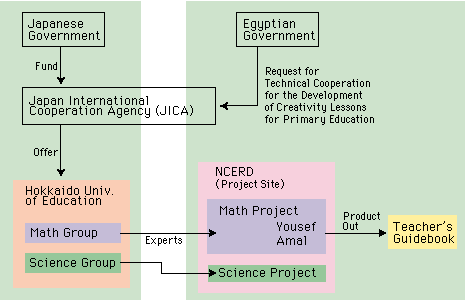Japanese
Background of Cooperartion

The following is an excerpt from "Attachment" to "Minutes concerning mini-project type technical cooperation for the development of creativity lessons of primary education in the Arab Republic of Egypt" (1997) :
- PROJECT TITLE:
Mini-Project-Type Technical Cooperation for the Development of Creativity Lessons for Primary Education in the Arab Republic of. Egypt
- PERIOD OF COOPERATION:
3 years
from December 1, 1997 to November 30, 2000
- PROJECT SITE:
National Centre for Education Research and Development (NCERD), Ministry of Education
- APPLICATION OF AGREEMENT:
This Project is to be carried out pursuant to THE AGREEMENT ON TECHNICAL COOPERATION BETWEEN THE COVERNMENT OF JAPAN AND THE GOVERNMENT OF THE ARAB REPUBLIC OF EGYPT signed on June 15, 1983.
- OBJECTIVES OF THE PROJECT:
(1) Overall Goal
Improvement of the teaching methods in primary education through the improvement of in-service teachers' training utilizing the newly compiled teaching guidebooks..
(2) Project Purpose
Development of creativity lessons and teaching materials of science and mathematics for primary education through the compilation of teaching methods and teaching materials guidebooks.
BACKGROUND AND JUSTIFICATION OF THE PROJECT:
Education has been regarded as one of the most important subjects and given high priority in the national project in the Arab Republic of Egypt. In Egypt, the literacy rate is low although the rate of the school enrollment ratio is rather higher than those of neighboring countries.
Thus, cooperation in the field of primary education was requested to Japan. In accordance with the request, JICA conducted research to look into the present educational situation in Egypt by sending a project formulation mission in 1992 and assigning a local technical advisor in 1995. As a result of the two studies, it is realized that it is necessary to acquire more detailed information in order to start a new cooperatioj in the fieid of education. From 1996 to 1997, 3 short-term experts worked with the staff of the Ministry of Education and conducted detaiied study to determine the type of project which Japan would be able to cooperate under the scheme of expert dispaching program. Also, in March 1996, the Minister of Education visited Japan and emphasized his country's desire for the cooperation in this field.
The study finally revealed that one of the biggest problems which Egypt is facing now is that teachers' teaching methods are not sufficient and that it is necessary to develop their abflity to create and innovate lessons and teaching materials for science and mathematics for primary education.
SCOPE OF TECHNICAL COOPERATION:
(2) Analysis of the present situation of science and mathematics in primary education
- To monitor classroom activities.
- To gather and analyze existing teaching guidebooks.
- To interview inspectors and teachers.
- To gather and analyze teaching materials.
(3) Technical transfer of teaching methods to Egyptian counterpart staff.
- To give presentations on mathematics and science education in Japan.
- To analyze present teaching methods and basic theory of mathematics and science education in Egypt.
- To compare the Egyptian and Japanese teaching methods and to extract what can be attributed to Egypt.
- To plan and manage seminars on teaching methods.
(4) Compilation of teaching methods and teaching materials guidebooks.
- To decide upon the important units to be included in the gufdebooks.
- To draft the guidebooks in consultation with the Steering Committee and Seminars
- To conduct experimental classes to check the draft of the guidebooks.
(5) Research on the improvement of in-service teachers' training utilizing the newly compiled guidebooks.
- To study and analyze actual teachers' training system.
- To study other donors' activfties in the fieid of teachers' training and analyze the results.
- To draft an improvement plan for teachers' training based on discussions with the Steering Committee and Seminars.

